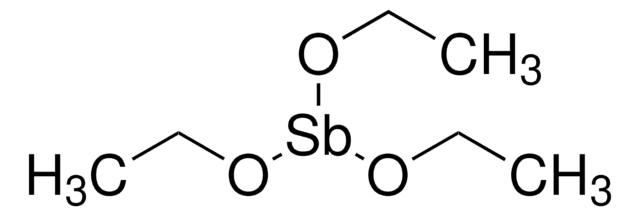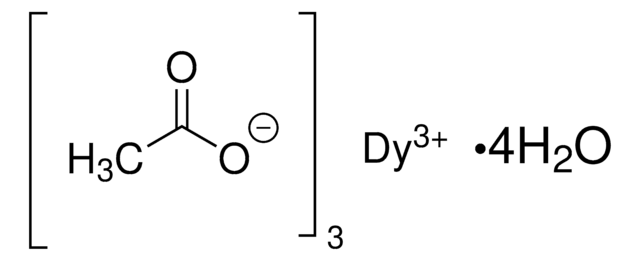483265
Antimony(III) acetate
99.99% trace metals basis
Synonym(s):
Antimony acetate, Antimony triacetate, Triacetoxystibine
About This Item
Recommended Products
Quality Level
Assay
99.99% trace metals basis
form
solid
reaction suitability
core: antimony
reagent type: catalyst
mp
126-131 °C (lit.)
density
1.22 g/mL at 25 °C (lit.)
SMILES string
CC(=O)O[Sb](OC(C)=O)OC(C)=O
InChI
1S/3C2H4O2.Sb/c3*1-2(3)4;/h3*1H3,(H,3,4);/q;;;+3/p-3
InChI key
JVLRYPRBKSMEBF-UHFFFAOYSA-K
Related Categories
Application
- New Complexes of Antimony(III) with Tridentate O,E,O-Ligands: Explores new antimony(III) complexes providing insights into their bonding and potential applications in materials science (U Böhme, M Herbig, 2023).
- Antimony (III) acetate as a catalyst for synthesis of xanthenes: Details the use of antimony(III) acetate as a catalyst in the synthesis of biologically active compounds, showcasing its efficiency in organic chemistry (F Hakimi, A Hassanabadi, 2015).
Signal Word
Warning
Hazard Statements
Precautionary Statements
Hazard Classifications
Acute Tox. 4 Inhalation - Acute Tox. 4 Oral - Aquatic Chronic 2
Storage Class Code
11 - Combustible Solids
WGK
WGK 2
Flash Point(F)
Not applicable
Flash Point(C)
Not applicable
Certificates of Analysis (COA)
Search for Certificates of Analysis (COA) by entering the products Lot/Batch Number. Lot and Batch Numbers can be found on a product’s label following the words ‘Lot’ or ‘Batch’.
Already Own This Product?
Find documentation for the products that you have recently purchased in the Document Library.
Customers Also Viewed
Our team of scientists has experience in all areas of research including Life Science, Material Science, Chemical Synthesis, Chromatography, Analytical and many others.
Contact Technical Service










